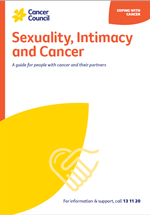- Home
- Breast cancer
- Managing side effects
- Changes to body image and sexuality
Changes to body image and sexuality
Breast cancer can affect how you feel about yourself (self-esteem) and make you feel self-conscious. You may feel less confident about who you are and what you can do. These feelings are common; give yourself time to adapt.
If you are finding it hard to adjust to changes, ask for support. Most cancer centres have psychologists who may be able to help.
Breast and areola appearance
You may find that having a breast reconstruction or wearing a breast prosthesis improves your self-confidence. Or you may prefer to not have a reconstruction and “go flat”.
You may be able to have an areola and nipple tattooed onto the breast after a mastectomy and breast reconstruction. Or you may choose a decorative tattoo to cover scars. For some people, this is a way to take control of their body and express themselves.
Low libido
Breast cancer and its treatment (particularly hormone treatment) can also reduce your desire for sex (libido). You may miss the pleasure you felt from the breast or nipple being stroked or kissed during sex. This may be the case even if you have a reconstruction.
If breast stimulation was important for arousal before surgery, you may need to explore other ways of becoming aroused. Some cancer treatment centres have sexual health clinics and other resources that may be able to help.
Vaginal dryness
Some treatments for breast cancer (particularly hormone therapy) can cause vaginal dryness, which can make penetrative sex painful. For most people, sex is more than arousal, intercourse and orgasms.
It involves feelings of intimacy and acceptance, as well as being able to give and receive love. Even if some sexual activities may not always be possible, there are many ways to express closeness.
For more on this, see Sexuality, intimacy and cancer and listen to our podcast on Sex and Cancer.
The Look Good Feel Better program can help you to manage the appearance-related effects of cancer treatment and boost self-esteem. Call 1800 650 960 or visit lgfb.org.au.
→ READ MORE: Menopause and fertility
Podcast: Coping with a Cancer Diagnosis
Listen to more of our podcast for people affected by cancer
More resources
Dr Diana Adams, Medical Oncologist, Macarthur Cancer Therapy Centre, NSW; Prof Bruce Mann, Specialist Breast Surgeon and Director, Breast Cancer Services, The Royal Melbourne and The Royal Women’s Hospitals, VIC; Dr Shagun Aggarwal, Specialist Plastic and Reconstructive Surgeon, Prince of Wales, Sydney Children’s and Royal Hospital for Women, NSW; Andrea Concannon, consumer; Jenny Gilchrist, Nurse Practitioner Breast Oncology, Macquarie University Hospital, NSW; Monica Graham, 13 11 20 Consultant, Cancer Council WA; Natasha Keir, Nurse Practitioner Breast Oncology, GenesisCare, QLD; Dr Bronwyn Kennedy, Breast Physician, Chris O’Brien Lifehouse and Westmead Breast Cancer Institute, NSW; Lisa Montgomery, consumer; A/Prof Sanjay Warrier, Specialist Breast Surgeon, Chris O’Brien Lifehouse, NSW; Dr Janice Yeh, Radiation Oncologist, Peter MacCallum Cancer Centre, VIC.
View the Cancer Council NSW editorial policy.
View all publications or call 13 11 20 for free printed copies.

